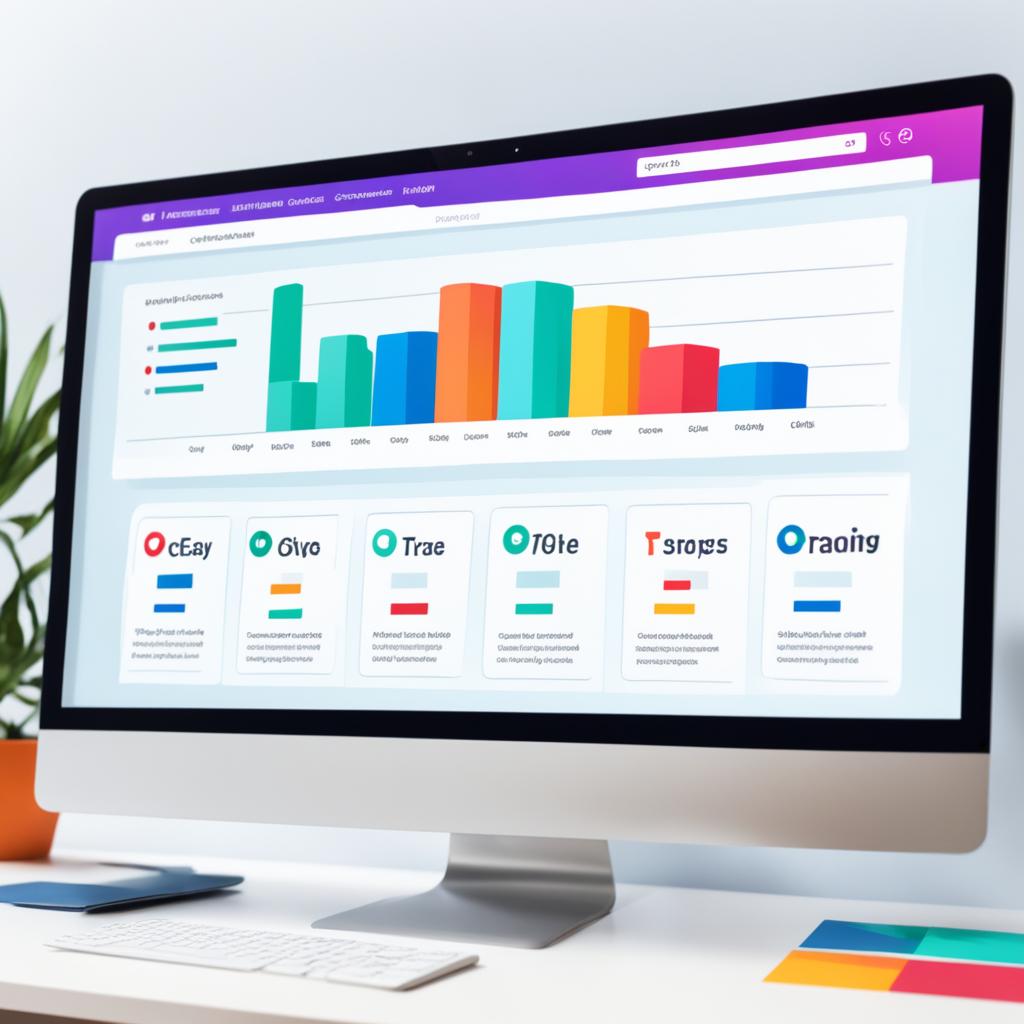As a small business owner, you’re always on the lookout for ways to shine among competitors. What if your key to online success was just waiting to be discovered? Good SEO writing can help you not only enter the digital market but also excel in it. It lets small businesses like yours stand out and compete strongly.
Picture your website rising to the top of search engine pages. When your online presence grows, it brings in both traffic and real customers. SEO levels the playing field, giving smaller businesses a fair shot against larger ones. Let’s simplify SEO and make it a tool for your business’s growth.
Understanding the Basics of SEO for Small Businesses
For small business owners, learning about SEO is key to doing well in digital marketing. Knowing the basics of SEO paves the way for better search rankings and more online visibility.
Defining SEO and Its Importance
SEO makes your website more appealing to search engines like Google. It involves improving your site’s structure, content quality, and making sure search algorithms can understand your website easily. Grasping and using SEO well can lead to higher visibility in search results and more targeted traffic coming to your site.
How SEO Can Benefit Your Small Business
SEO brings many benefits to your business. Here are the main advantages:
- Increased Organic Traffic: Good SEO puts your business in front of people looking for what you offer. This leads to more organic traffic.
- Higher Search Rankings: With smart SEO, your website can climb higher in search results. This often makes your business seem more credible and trustworthy to potential customers.
- Enhanced User Experience: SEO is about more than just appealing to search engines. It’s also about making your website faster, easier to use, and filled with valuable content for visitors.
Good SEO practices can help your small business compete with bigger players. They allow you to grow and maintain your place in the online world. This is vital for the growth and sustainability of small businesses today.

Use these insights on SEO basics and benefits as a guide. Make wise choices to boost your online presence. Remember, improving your search rankings means moving closer to business success.
What is SEO Writing?
Today, knowing how to write for SEO is key for boosting your internet visibility. SEO writing aims to engage readers and meet search engine criteria. Thus, it makes your content appealing to people and search algorithms.
Good SEO writing comes from smart keyword use. You blend important phrases into your text without disrupting its natural tone. It pairs writing flair with the technicalities of digital marketing. Proper SEO goes beyond simply filling text with keywords. It means making your content rich and meaningful for your audience.
Let’s look at the main aspects of SEO content writing:
- Keyword Research: Finding the exact terms your audience is searching for.
- Content Relevance: Creating content that is both useful and tied to your keywords.
- User Engagement: Designing content that keeps readers interested, promoting longer visits.

The end goal of top-notch SEO writing is to not just show up on search result pages but to attract clicks and meet user needs. Aligning your content with what people seek boosts your organic search position. Ultimately, this leads to increased conversions.
| SEO Aspect | Importance | Impact on SEO |
|---|---|---|
| Keyword Optimization | Crucial | Directly affects search rankings |
| Engaging Content | High | Improves user engagement and time spent on site |
| Content Relevance | Vital | Makes your content more authoritative and relevant for search engines |
Mastering these essential elements of SEO content writing will guide you in crafting content that not only grabs your audience but also climbs search engine rankings. This makes SEO optimization a must-have skill for content creators.
Mastering Keyword Research for Targeted Content
Understanding keyword research is key in SEO. It makes sure your content connects with the right audience. We will see why keywords matter in optimizing your content. You’ll also learn about the best tools for finding these terms.
The Role of Keywords in SEO Writing
Keywords are super important in SEO writing. They tell search engines what your content is about. Finding and using the right keywords is a must. It helps get your content to the people who want to see it. This means more targeted traffic to your website.
Tools and Techniques for Effective Keyword Research
There are many tools to help find the right keywords. Google Keyword Planner, SEMrush, and Ahrefs can get you detailed data. They reveal how your audience searches. These tools show both popular and specific phrases.
- Google Keyword Planner is great for beginners. It offers keyword ideas from Google’s vast search data.
- SEMrush is perfect for checking out competitors’ keywords. It helps you plan your own strategy.
- Ahrefs shows detailed keyword info, like search volume and difficulty. It helps make smart choices.
Using these tools helps tailor your content strategy. You can meet your audience’s needs better by targeting the right keywords.

To do SEO well, you must know not just what your audience is looking for. But also how they search for it. Research tools can make your content more focused and powerful. Smart use of these tools helps your content reach and influence your target audience.
Crafting High-Quality Content Around Keywords
When you start creating content, it’s important to mix SEO with interesting writing. You’ll want to boost your online visibility or get more conversions. The secret is to add keywords well into your strategy without losing the reader’s interest.
Writing Techniques that Engage and Convert
Using stories, a friendly tone, and clear instructions are key to making text that catches attention. These methods create a bond with your audience and make them want to act. If you do it right, you keep readers interested and increase the chance of them taking action.
Maintaining a Natural Flow While Incorporating Keywords
Adding keywords right is vital for SEO, but it needs to sound natural. Putting too many keywords can make your writing hard to read and hurt your SEO ranking. Try to use synonyms and similar phrases to keep your text interesting and reader-friendly.
Here are quick tips on keeping a good balance:
- Use keywords in a way that adds to the story, not interrupts it.
- Put keywords in headings, subheadings, and the body where they fit smoothly.
- Use LSI keywords to give your content context without repeating the main keywords too much.

Focusing on these points helps you create content that not only ranks well but also offers real value to your readers. This makes your site a top choice for reliable info and solutions.
| Element | Technique | Impact on SEO | Impact on Reader Engagement |
|---|---|---|---|
| Keyword Integration | Use in headings, first paragraphs, and strategically throughout the text | Improves rankings by signaling topic relevance to search engines | Helps readers quickly identify the relevancy of the content |
| Storytelling | Incorporate real-world examples and personal anecdotes | Increases time spent on page, which can signal quality to search engines | Builds a personal connection, increasing the likelihood of engagement and sharing |
| Natural Flow | Smooth incorporation of keywords, use of synonyms | Prevents keyword stuffing penalties, enhances content discoverability | Improves readability and keeps the reader interested throughout the piece |
Optimizing On-Page Elements for Better Rankings
Want to make your website more visible and rank higher in search engines? Focus on improving your on-page SEO. This means adjusting things like title tags, meta descriptions, and how you use header tags. By doing this, your website becomes more appealing to both search engines and people.
Title Tags and Meta Descriptions that Attract Clicks
Title tags and meta descriptions are key to catching someone’s eye in search results. Make your title tags short and start with the main keywords. Your meta descriptions should clearly summarize what’s on the webpage. This encourages people to click on your website. These elements help get more clicks and can boost your website’s rankings too.
To make these parts of your site even better, use words that get people to take action and include important keywords. This makes visiting your site a better experience and helps people find you more easily.
Utilizing Header Tags and Content Structure
Using header tags well, like H1, H2, H3, helps organize your content. It makes your website easier for search engines and people to understand. Headers act like signs that guide readers through your article. Using them right can really help with your SEO.
Be sure to arrange your headers in a logical way. Start with an H1 for your main title. Then use H2, H3, and others for subtopics. This helps search engines figure out what’s most important on your page.

When working on your on-page SEO strategy, ensure everything is fine-tuned. Paying attention to how your content is organized and your meta-data can make your site more attractive. Not just for search engines but for your potential customers too.
Building a Content Strategy that Drives Traffic
In the digital world, having a content marketing strategy is crucial. A SEO-driven content plan helps increase driving web traffic and boost your online presence.
A good strategy is like a roadmap for your content. It matches your business goals. It makes sure everything you create is useful and fits with market trends.
- Define your audience: Know who your content is for. It’s key to making content that grabs and keeps attention.
- Analyze market needs: Make your content solve your audience’s problems or needs.
- SEO optimization: Use SEO best practices to help your content get seen by more people.
When you use these ideas, you’re not just adding to your site randomly. You’re creating something valuable. This will help grow your site’s organic traffic and size.

Also, a strong content marketing strategy helps turn visitors into loyal customers. Every article should get people involved, be shared, and match what users want.
Begin by checking your existing content for ways to get better. Improving your SEO-driven content plan boosts how visible you are online and supports lasting success.
So, a smart content marketing strategy is key to driving web traffic. It helps you stand out online.
The Power of Blogging and Regular Content Updates
Embracing blogging is more than keeping your audience hooked. It’s key for a site full of life and good SEO. Updating your blog regularly and using everlasting content can change your approach from dull to dazzling.
Developing a Blogging Schedule That Works
Using blogging for SEO means making a schedule that always brings new content. This keeps your followers coming back for more. It also tells search engines your site is up-to-date, which is great for your SEO rank. Adding both trending topics and everlasting content gives your strategy both immediate and long-lasting appeal.

Ideas for Evergreen Content
Everlasting content is vital for a strong blogging plan. Such content stays important over time, pulling in traffic years after posting. How-to guides, big resource lists, and expert advice are good examples. Having this content in your plan brings more visitors and boosts SEO by keeping your content fresh.
- Creating detailed tutorials that solve common industry issues
- Developing top-tip articles for evergreen subjects
- Conducting interviews with industry experts to share timeless insights
- Crafting comprehensive guidebooks that remain relevant
By using these blogging strategies wisely, you can greatly improve your content marketing and SEO. It keeps both your viewers and search engines very interested.
Link Building Strategies for Small Business Owners
Diving into SEO can boost your small business online. Every link acts as a vote of confidence, increasing your website’s authority. Building both inbound and outbound links is key for a strong SEO profile.
Understanding Inbound and Outbound Links
Inbound links or backlinks come from other sites and point to yours. They show your site’s reputation and authority. Outbound links from your site to others help search engines understand your content. They also add credibility if linked to trusted sites. Finding the balance between these links can elevate your search rankings.
Building Relationships with Other Websites
Building relationships is key for SEO success. It’s about connecting with others in your field to form beneficial partnerships. These relationships can secure authoritative inbound links and expand your network.
Focus on genuine engagement and offering value. This approach fosters long-lasting connections, beyond just trading links.


Leave a Reply
You must be logged in to post a comment.